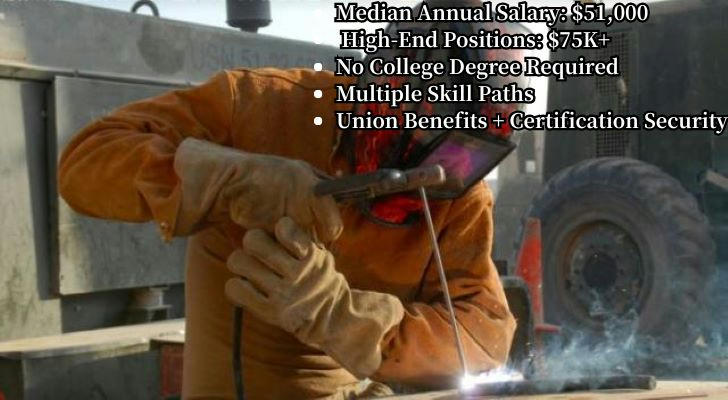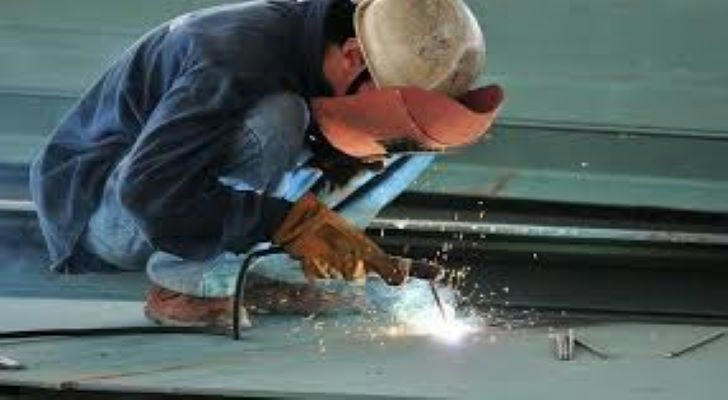Panorama of welder profession: from zero foundation to high-paid expert, giving you real life craft + freedom
Median Annual Salary: $51,000 | High-End Positions: $75K+ | No College Degree Required | Multiple Skill Paths | Union Benefits + Certification Security

Welding is no longer just blue-collar labor; welding technology is now a key path to stable income and career autonomy. In 2024, the median annual salary for Welders, Cutters, Solderers, and Brazers in the US was $51,000 ($24.52/hour), with high-end fields (like underwater welding, advanced inspection) easily exceeding $75K+!
I. Welder Types Demystified: Diverse Roles, Clear High-Pay Paths
Common Entry-Level Positions:
Arc, MIG/TIG, Resistance, Brazing/Braze Welding: Foundational metal joining processes, used in shops and field work.
Daily tasks include precise blueprint reading, measuring, welding, cutting, etc.
Specialized High-Pay Positions:
Boilermaker Welder: Works on large pressure vessels. Avg. Salary: $71,000.
Welding Inspector (CWI/QC): Ensures quality & supervises welding. Avg. Salary: $78,000.
Underwater Welder: Requires commercial diving certification. Salary varies widely; avg. $66,000, high-end can reach $85K+.
Welding Engineer / Automated Welding Technician: Combines welding with programming. Salary: $75K–90K.
II. Salary Deep Dive: Entry-Level vs. High-End Comparison
| Position Level | Hourly Range | Estimated Salary | Path Highlights |
|---|---|---|---|
| Entry-Level Welder | $18–24 | $38k–50k | Learn while working, quick entry |
| Mid-Level Welder | $25–30 | $50k–60k | In-demand skills, stable income |
| Advanced/Specialist | $30–45 | $60k–90k+ | Specialized skills = higher pay |
| Underwater/Boiler/Inspector | $40–80+ | $70k–95k+ | High skill, high physical demands |
Top 10% of Welders earn over $75,850 annually. ZipRecruiter data shows AWS Certified Welders in California avg. $23.28/hr, with top earners over $31.08/hr. Reddit users report Union Welder pay reaching $40–48+/hr, with total compensation (including benefits) equivalent to $75–80/hr. Reports suggest top underwater welders can earn $70k–90k/year, but often involve remote locations and significant time away from family.
III. Industry Demand & Career Outlook: High Replacement Needs, Coexistence of Manual & Automated Work
Welding jobs projected to grow 2% from 2023-2033 (slightly below average), but ~45,800 job openings per year are expected, mainly due to retirements and career changes. Nearly half of the current ~450,000 welders are approaching retirement age, creating high replacement demand. Automation may reduce basic welding roles, but demand for advanced welders and tech/programming hybrid roles will significantly increase.
IV. Entry Paths & Rapid Advancement

Easy Entry: 3 Steps to Launch Your Skilled Career
Complete High School or GED.
Enroll in Vocational School or Apprenticeship: Options include community colleges, technical schools, or industry unions; most offer paid on-the-job training.
Obtain Industry Certifications: Examples: AWS Certified Welder, CWI Inspector Certification, ASME codes.
Clear Advancement Path, Strong Long-Term Earnings
Most entry-level training takes only 6-12 months, with apprentices earning while learning. After training and certification, reaching $50K+ income within 1-2 years is common. With experience, move into inspection, management, process programming, or training roles for significantly higher income and stability.
Flexible Learning Options
Hybrid (online + in-person) courses, night school, union evening programs cater to working adults. Community colleges (e.g., San Jacinto College, Lincoln Tech) offer short-term programs enabling entry in under 6 months.
V. Benefits & Job Advantages
Multiple Protections Under Unions
Union members enjoy 401(k), Medical/Dental/Vision Insurance, Union Pension Plans.
Guaranteed Paid Vacation (typically 10-15 days/year), Holiday Pay (double time), Overtime Pay.
Unions negotiate stable contract wages, effectively preventing wage suppression.
Corporate Benefits Enhance Quality of Life
Large companies (e.g., General Electric, Caterpillar, SpaceX, Bechtel) offer comprehensive health benefits to welders. Many provide Annual Bonuses, Performance Incentives, Tool Allowances, and Re-training Grants. Some offer Housing Assistance or Relocation Support, beneficial for remote work.
Stronger Long-Term Security
Welding is skill-intensive; unemployment risk decreases significantly with experience compared to general blue-collar jobs. Skilled tradespeople have higher resilience in any economic cycle, maintaining stable employment even during recessions.
VI. Safety Environment & Job Requirements
Safety Training
Pre-employment OSHA 10 or OSHA 30 safety certification required. Most companies provide PPE (Personal Protective Equipment): flame-resistant clothing, safety glasses, respirators, welding helmets.
Health Risk Management
Common risks: heat, electrical shock, fumes, eye damage; controllable with proper gear. Factories/construction sites typically have ventilation systems, air purifiers, automatic fire suppression. Regular physicals, hearing tests, lung function tests are mandatory under union rules.
Job Requirements & Aptitude
Basic math/physics understanding, blueprint reading skills, strong focus.
Adaptability to various environments (heat, outdoors, confined spaces).
Attention to detail and sustained physical stamina.
VII. Real Practitioner Insights 🎙️
"Started around $18/hr, jumped to $28/hr after 3 years. With the union, I'm at $48+/hr, total comp hits $75–80/hr with benefits." — Reddit Union Welder
"After getting my CWI cert, salary jumped to $70K, and the workload is more manageable." — AWS Certified User
"Underwater welding is physically demanding + needs special certs. Top earners hit $90K/year, but most are stable around $66–80K." — Reddit Underwater Welder
VIII. Career Development Roadmap
Technical Expert Path: General Welder > Advanced Technician > Welding Inspector > Welding Engineer/Technical Manager.
Entrepreneurship Path: Start your own shop/company after years of experience.
International/Underwater Roles: Require diving + welding certs; high pay but demanding lifestyle.
Automation Path: Master welding + robotics/PLC programming for more future-proof roles.
IX. Is It For You? High Pay for the Right Fit
Ideal For:
People who enjoy hands-on work, physical stamina, and visible results.
Those wanting to earn through skills, avoiding student debt.
Considerations:
Challenging work environments and inherent safety risks.
High earning potential, but cost of living and training investment are factors.
🔚 Conclusion: Welding = Skills + Income + Freedom
Impressive Earnings: Salaries start ~$50K, rising to $75K+ with advanced skills.
Low Barrier to Entry: No college degree needed; apprenticeships build careers.
Clear Pathways: Multiple specializations, entrepreneurship, or management options.
Strong Protections: Comprehensive insurance benefits and safety standards.
Sustained Demand: High replacement needs ensure plentiful job openings.
If you're willing to work hard and find satisfaction in growing your skills alongside your income, welding is a career path worth serious consideration. Ready? Start building your future, one weld at a time.
